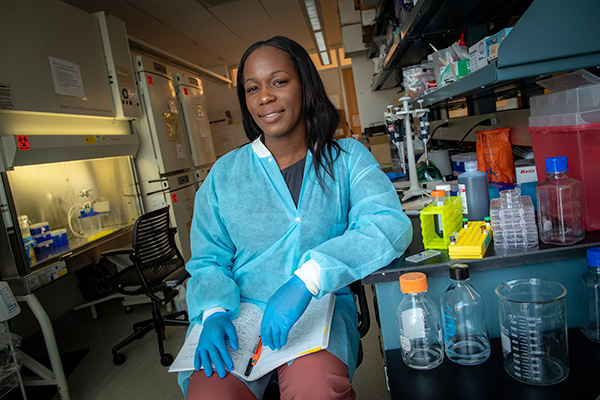
Trivia Frazier-Wiltz (MBA ’18)is the founder of Obatala Sciences, a biotech startup that’s currently commercializing a technology that models fat outside the human body and uses it to predict human response.
ALUMNI SPOTLIGHT Trivia Frazier-Wiltz (SSE ’08, M ’12, MBA ’18)
Trivia Frazier-Wiltz always knew she wanted to build a career in New Orleans, but she didn’t want just any career. She wanted one that also allowed her to give back to the community and do good for the world. That’s a tall order, but the New Orleans native is well on her way to making it a reality.
As president and CEO of Obatala Sciences Inc., she’s commercializing a groundbreaking technology with the potential to help pharmaceutical companies bring lifesaving drugs to market sooner and at much less expense.
Frazier-Wiltz always had an interest in science. As an undergraduate at Dillard University, she became one of the first participants in the Dillard-Tulane dual-degree program in engineering, which enabled students to earn both a science degree from Dillard and an engineering degree from Tulane. She stayed at Tulane after earning her bachelor’s in biomedical engineering and eventually earned a PhD in biomedical science. After completing postdoctoral work at Pennington Biomedical Research Center and Tulane’s Center for Stem Cell Research, Frazier-Wiltz accepted a tenure track position at Dillard, but she continued to do research with Jeff Gimble, her postdoctoral adviser at Tulane.
“We set out to prove that there were stem cells in fat,” said Frazier-Wiltz. “We published that study, and we continued to work together after I joined the faculty at Dillard.”
Everything changed in the summer of 2016, when her research team received a grant from the National Science Foundation.
“We were advised by our NSF-assigned mentor to commercialize our technology,” said Frazier-Wiltz. “So I took a leap of faith and left my tenure-track position.”
While working as a project director at LaCell, the company formed by Gimble and research partner Xiving Wu, Frazier-Wiltz began to develop a new technology.
“We can model fat outside of the body and use it to predict human response,” Frazier-Wiltz said of the technology known as “fat-on-a-chip.”
“The tech allows us to understand human response much earlier in the process before spending lots of money on clinical trials.” Typically, pharmaceutical companies first test drugs using cells in a dish, then on mice and finally on humans, a long, expensive process with the added complication that drugs behave very differently in mice than they do in humans.
“During customer discovery, we heard from pharmaceutical companies that there’s a need for our technology,” said Frazier-Wiltz. “Let’s reduce the amount of money we’re wasting on trials by knowing right away.”
With support and encouragement from both Gimble and the NSF, Frazier-Wiltz spun off Obatala Sciences in 2017 to commercialize the fat-on-a-chip technology. Soon after starting the company, however, she realized there was a gap in her knowledge.
“I was applying for grants and putting a commercialization plan together, but everything in the business world was completely new,” she said.
To gain the business foundation she needed, Frazier-Wiltz enrolled in the Freeman School’s MBA program, where she acquired not only a broad base of business skills but also a valuable network. “All of my classmates are phenomenal,” she said. “Now I can reach out to people halfway across the globe for advice.”
In addition to helping drug companies save money, Frazier-Wiltz believes her technology has the potential to establish new approaches to drug testing and the fight against obesity and metabolic disorders.
“We have the ability to model tissue of people from different backgrounds,” she said. “The way bodies respond to drugs can be very different.”
Ultimately, Frazier-Wiltz sees the company as a pioneer in personalized medicine, and she hopes to collaborate with other organ-on-a-chip companies to model multiple systems.
As she begins actively fundraising for seed capital, Frazier-Wiltz is proud to be building not just a company but a healthier, more vibrant entrepreneurial community.
“The success of Obatala is very important to me,” said Frazier-Wiltz. “But Obatala’s success goes hand-in-hand with the success of the biotech ecosystem here in New Orleans.”
